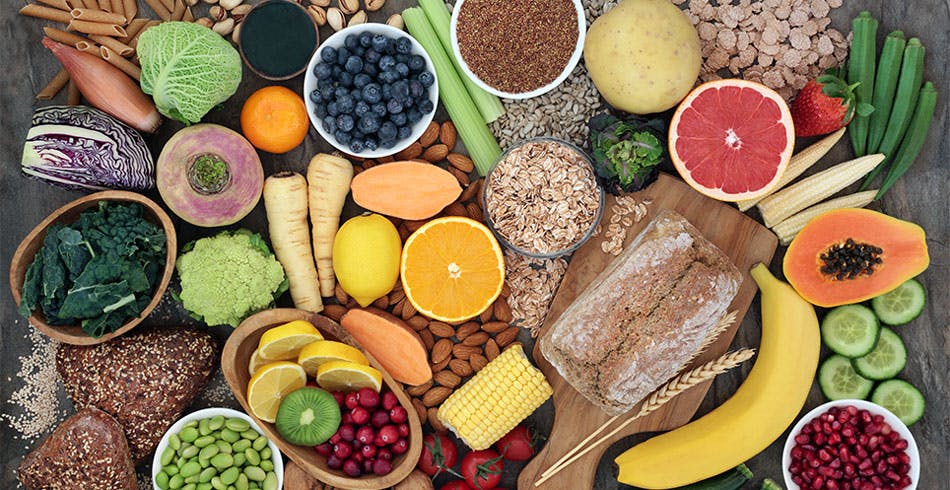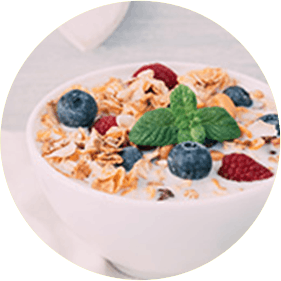3 Signs You’re Not Getting Enough Fiber
A dysfunctional digestive system could be a tell-tale sign of what you’re missing


There’s fiber in so many healthy foods, yet the reality is that 95% of U.S. adults don’t meet their recommended fiber requirements.1 Daily recommended fiber intakes are 25 grams for women and 38 grams for men ages 19-50.2 For perspective, that’s about eight and twelve bananas, respectively.3
The digestive system relies heavily on fiber to keep it moving like a well-oiled machine. Without it, your digestive system may not run as smoothly. The good news is you can spot most of these signs easily on your own, and if you’re in fact lacking fiber, you have the power to make those adjustments. Here are some common indicators that you’re not getting enough dietary fiber in your diet daily.
1. Occasional constipation†
Extended trips to the bathroom and feeling backed up – these uncomfortable signs may be your body’s way of telling you to add more fiber to your diet. Since fiber serves as bulk for your stools, it can regulate how often you have a bowel movement and general digestive health.†† In fact, a recent meta-analysis pooled data from several fiber studies and found that including fiber in your diet regularly helps with stool frequency (i.e., the number of times you pass stool daily).††4
On the other hand, a lack of fiber in your diet could cause the opposite problem – occasional diarrhea. In the absence of fiber, food can move through your gastrointestinal tract much quicker, causing loose stools.††5
These stark contrasts are possible because there are two varieties of fiber. First, there’s insoluble fiber, which acts like a broom, sweeping through your bowels to get everything out and keep things moving at a manageable pace. Then there’s soluble fiber, which absorbs water and forms a gel-like substance, helping you pass smooth and consistent stools.††6
2. Difficulty managing hunger
We’ve all been there – you eat a complete meal and then a short while after, you’re hungry all over again. This could be tied to your meal’s fiber content. What makes fiber critical to regulating your digestive system also impacts your hunger and ability to feel satisfied after meals. It’s largely because fiber adds bulk and thick consistency to slow down the rate at which food passes through your body, so your stomach takes its time to clear out.
An empty stomach generates hunger signals that let your brain know that it’s time to eat again. If food passes through the stomach too quickly, your hunger sets in sooner and more frequently.*7
Fiber does not just simply slow down the stomach’s digestion, the thickness from soluble fibers may also extend food’s passage through the intestine, allowing better absorption of nutrients and further taking advantage of the processes that help you feel satisfied after eating.7
3. Difficulty managing bodyweight
While eating a well-balanced diet and regular physical activity are the best tools to maintain a healthy bodyweight, a low fiber intake could throw a wrench into your healthy lifestyle and stand in the way of achieving your goals.
Without fiber, food rushes through your stomach, increases your hunger and puts temptation in the way of moderation. You may find yourself reaching for a snack earlier in the day or later at night, or even doubling up on serving sizes. There may be some benefit to adding a prebiotic fiber supplement, such as Benefiber Healthy Shape, which can help you feel fuller longer.‡
There’s also evidence that adding fiber to your diet reduces the amount of energy, or calories, per unit weight of food, which is also known as the food’s energy density.7 It makes sense, since naturally-occuring fiber in fruits and vegetables lowers the foods’ energy densities. Low energy density is another one of fiber’s features that helps you feel more satisfied after a meal, helping you to better manage your eating habits.7
The takeaway
Fiber’s importance to digestion makes it a necessary nutrient not just to GI function, but also to overall health and wellness. Try your best to get all the fiber you need from food, but if you need some extra help, supplements like Benefiber can help you supplement your recommended daily fiber intake.
Once you incorporate a balanced eating plan rich in fiber, not only will your digestive system thank you, you’ll feel good about nourishing your whole body and working towards better health.*
†Benefiber Advanced Digestive Health helps relieve occasional constipation.
††Applies to fiber derived from food, not supplements
‡Clinical studies show benefits with regular use.
*These statements have not been evaluated by the Food and Drug Administration. These products are not intended to diagnose, treat, cure or prevent any disease.
Use as directed.
Show References
- Quagliani, Diane, and Patricia Felt-Gunderson. “Closing America’s Fiber Intake Gap.” American Journal of Lifestyle Medicine, vol. 11, no. 1, July 2016, pp. 80.85. PubMed Central, doi:10.1177/1559827615588079. https://www.ncbi.nlm.nih.gov/pmc/articles/PMC6124841/.
- Institute of Medicine (U.S.) Panel on Macronutrients. Institute of Medicine (U.S.) Standing Committee on the Scientific Evaluation of Dietary Reference Intakes. Dietary Reference Intakes for Energy, Carbohydrate, Fiber, Fat, Fatty Acids, Cholesterol, Protein, and Amino Acids. National Academies Press; Washington, DC, USA: 2005. p. 339. https://www.nal.usda.gov/sites/default/files/fnic_uploads/energy_full_report.pdf
- Dahl WJ, Stewart ML. Position of the Academy of Nutrition and Dietetics: Health Implications of Dietary Fiber. Journal of the Academy of Nutrition and Dietetics. 2015;115(11):1861-1870. doi:10.1016/j.jand.2015.09.003 https://pubmed.ncbi.nlm.nih.gov/26514720/.
- Yang, Jing, et al. “Effect of Dietary Fiber on Constipation: A Meta Analysis.” World Journal of Gastroenterology, vol. 18, no. 48, Dec. 2012, pp. 7378–83. PubMed, doi:10.3748/wjg.v18.i48.7378. https://www.ncbi.nlm.nih.gov/pmc/articles/PMC3544045/
- Constipation, Diarrhea and Fiber. Accessed 8 Oct. 2020. https://www.oncologynutrition.org/erfc/eating-well-when-unwell/chemotherapy/constipation-diarrhea-and-fiber.
- “Does Fiber Relieve or Cause Constipation? A Critical Look.” Healthline, 15 Sept. 2016, https://www.healthline.com/nutrition/fiber-and-constipation-truth.
- Slavin, J., and H. Green. “Dietary Fibre and Satiety.” Nutrition Bulletin, vol. 32, no. s1, 2007, pp. 32–42. Wiley Online Library, doi:10.1111/j.1467-3010.2007.00603.x. https://onlinelibrary.wiley.com/reader/content/10.1111/j.1467-3010.2007.00603.x/format/pdf/OEBPS/pages/1.page.xhtml
Nourish the Goodness Inside
Benefiber is an easy way to add fiber to your life.
$1.50 OFF BENEFIBER




